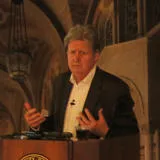Robot-assisted surgery
This project builds on long-standing research within the Work, Interaction & Technology Group on teamwork and collaboration in the operating theatre to investigate how the use of surgical robots reshapes the distribution of work, the nature of tasks, and communication during surgical procedures. It draws on ethnographic fieldwork and video recordings in operating theatres.
Introduced in surgery in the late 1990s, the use of robots has become common, even predominant in some specialties. Because surgical robots reproduce the surgeon’s actions and thus have almost no autonomy, robotic surgery is also commonly known as ‘robot-assisted surgery’. On the other hand, their introduction in the operating theatre has led to a significant re-arrangement, removing the surgeon from patient and team at bedside.
Our work considers the re-adjustment of team working to manage this different spatial configuration, examining features of team coordination, the nature and distribution of tasks, and the role of the different professionals. And research in healthcare recognises that ‘non-technical skills’ such as communication, teamwork and situational awareness are critical to the outcome of operations and patient safety.
Our work on robotic surgery has been underpinned by two key projects. Firstly, an NIHR-funded study led by Professor Rebecca Randell explored teamwork in robot-assisted surgery as part of a wider realist process evaluation of the implementation and integration of surgical robots into routine practice. Secondly, as part of the Trustworthy Autonomous Systems Hub, WIT are undertaking further research on robotic surgery.
The co-PI on this project is Professor Prokar Dasgupta, a surgeon who has contributed to development of robotics in surgery since the early years.





